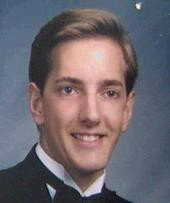Primeau acknowledged that it was time based on two conversations: a blunt sit-down meeting with Flyers trainer Jim McCrossin, who said Primeau stood no chance of being cleared to play, and a meeting with Flyers brass, who impressed upon him, finally, that a decision needed to be made quickly so that the start of training camp would not be clouded by continuous question marks about a comeback.
I'm sure others will have opinions, and they're by and large correct ones, but the two moments that seemed to define Primeau as a player in the Flying "P" crest are:
- Game 4, 2000 Eastern Conference Semifinals, Pittsburgh, 2:30 AM. The future captain's electrifying top-shelf shot deep into overtime number five, tied the series at 2 and sent all the momentum swinging back the Flyers way. Facing a 2-0 series hole, the Flyers come back to win four straight.
- Game 6, 2004 Eastern Conference Finals, Philadelphia. His goal with 90 seconds left in regulation completed a hard-fought game where the Flyers led, lost it, and clawed back to win in overtime. The miraculous behind-the-crease stuff-in, which began as an errant pass off his skate, signalled the unison of luck, skill, and seizure of the critical moment fans had been waiting for since the end of the fractured Eric Lindros Era.
A trade to Hartford, which then became the Carolina Hurricanes, allowed Primeau to stretch out, find his game, and become both a scoring and locker-room leader on a rebuilding squad. Then came the contract squabble in 1999 which dragged on through the new millennium, forcing a deal to Philadelphia in exchange for Rod Brind'Amour and Jean-Marc Pelletier in January, 2000. The next year, with Lindros' absence, John LeClair's injuries, and a virtual clean slate, #25 scored a career high 34 goals. Following that, the ignominy of being identified as the point person for the players' mutiny against then-head coach Bill Barber after an abysmal first round loss to Ottawa. After a season and a half under the tutelage of Ken Hitchcock, his potential was finally, fully realized.
Whoever gets to step into that void of leadership, now that the captain has unfortunately gone down on dry land, will have to put his own stamp on the office. It is a demanding job for any player, and a great honor, made even more demanding as Hitchcock's M.O. has always been to use the captain as the chief messenger of the head coach's ideas, strategy, and attitude. In an unexpected twist, one of the Flyers' veteran Europeans, Sami Kapanen, said it would be "an honor" to be asked to assume that role. The finalists for the position appear to be narrowed to Simon Gagne, Peter Forsberg, and Mike Richards, an underdog who may eventually be groomed precisely for that role.
The man who gets to wear that "C" must be able to withstand the harsh light of the media, as well as the cold, piercing stare of the main man behind the bench. Due to his lingering concussion symptoms, Keith Primeau can no longer withstand any light, harsh or otherwise, for very long. Whoever follows in his footsteps would do well to use him as an advisor, since the embattled center plans to remain in Philadelphia, awaiting the next phase of his hockey life.
The fifteenth captain in team history has a unique opportunity - to be the uniting force in what may turn out to be a fresh, young, speedy squad. An historic parallel exists: back in 1984, upon Bobby Clarke's retirement, Clarke had major input into selecting Dave Poulin as the leader of what was then the youngest team in professional sports. That 1984-85 team, without Clarke, Bill Barber, or Darryl Sittler, won 53 games, sported the best record in the league, and advanced to the Finals.
Expectations being a funny thing in the sports-crazed Eastern megalopolis, thousands of Flyers fans will no doubt be dreaming that the bearer of the "C" will lift that Cup high come June. Short of that, a timely overtime winner, and some key plays in wins over the Devils and Rangers will fit the bill just fine.

No comments:
Post a Comment